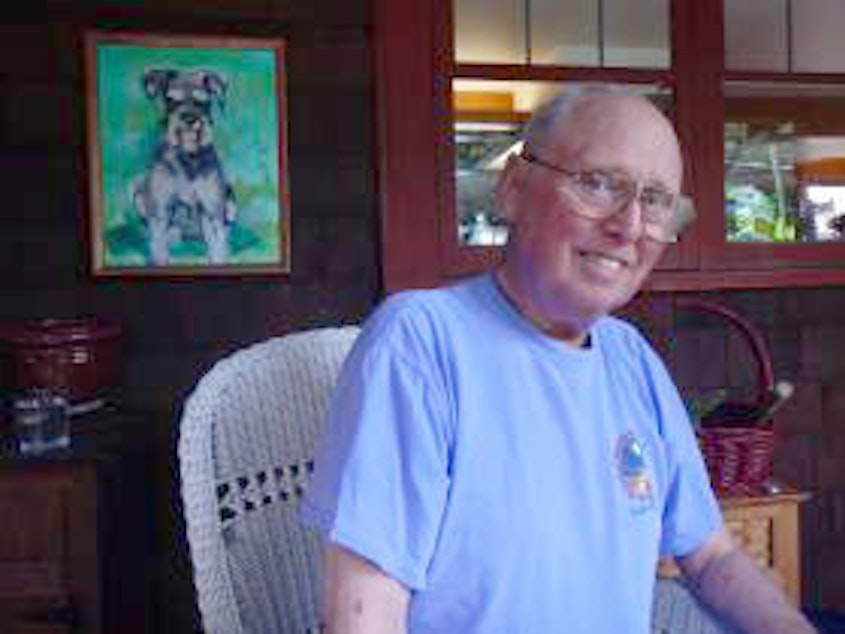Hospitals, Nurses Clash Over How To Keep Patients From Falling

Gene White of Des Moines, Wash., has had a litany of health problems in recent years: testicular cancer; cancer in his nervous system; pneumonia; the fungus Aspergillus infecting his lungs. The retired airline pilot says he got great care at Swedish Medical Center and the other Seattle hospitals that helped him survive those life-threatening diseases.
When White went to Swedish First Hill in March for some back pain, things started well. His ailment turned out to be a pinched nerve, not more nerve cancer, as he and his wife had feared. He received a dose of steroids for his pinched nerve and was set to go home after an overnight stay.
“That one dose of steroid, boom, it took care of me," White says. “I was feeling on top of the world. Four a.m. came, and I hadn’t slept a bit.”
White told a nurse he couldn’t sleep. She gave him a tablet of zolpidem, the prescription sleeping pill marketed as Ambien.
The popular medication is known for leading to sleepwalking and even “sleepdriving.” A study last year from the Mayo Clinic in Minnesota found hospital patients who’d taken zolpidem were four times more likely to suffer a fall. White says:
“I went to sleep almost immediately, and I got in a dreamlike state. Being a pilot, my dream had me in an airplane, and I was flying a beautiful wooden-interior airplane about the size of a DC-3, and I was having a hell of a good time.”
The next thing White knew, he was crumpled on the floor on the other side of his hospital room.
“I had broken three ribs on my left side, hitting the wash basin,” White says.
Instead of going home that morning as planned, he spent two more weeks at Swedish, unable to walk or even get out of bed. Then months in a nursing facility with intensive physical therapy. Even six months after his fall, walking from his bedroom to his back porch for a radio interview is still a major undertaking.
Swedish officials can’t discuss White’s case without violating federal privacy law. But they say since Swedish revamped its fall prevention programs in 2011, the hospital carefully assesses each patient for their risk of falling. High-risk patients get special attention, including beds with unmistakable alarms – they blare “Mary Had A Little Lamb” – when patients try to get up.
Gene White says he got none of that special attention, even after he was on the Ambien.
Susan White says she’s frustrated by how badly her husband’s health has been set back by an event that never should have happened in the first place.
“There’s no doubt there should have been an alarm on the bed,” she says. “Would that have changed anything? Would he have gotten out of bed before somebody got there? Maybe it would’ve done something.”
Nurses say alarms help, but falls and other medical mishaps often share a root cause: understaffing.
“You still need a person to be close enough nearby to be able to respond to the alarm,” says Bernedette Haskins, an operating room nurse at Swedish Cherry Hill.
“Every nurse has a story about being short-staffed, about working an entire 12-hour shift without a break, ” Haskins says. During a half-hour break in the middle of her 12-hour shift, she wolfed down lunch between a reporter’s questions.
Nurses unions say fatigue and just not having enough hands on deck can lead to errors and to the quality of patient care suffering.
“I lived it for seven years,” Haskins says. “I lived with staffing shortages and difficulties and got to a point where I couldn’t do it any more.”
After feeling stretched too thin to care for all her patients well, Haskins switched to nursing in the operating room, where she only has to take care of one patient at a time.
More Nurses, Fewer Falls
Academic studies support what nurses and their labor unions say: More nurses on the hospital floor means fewer patients falling.
Unions are pushing legislation at the state and federal levels to force hospitals to beef up their nursing staffs in line with nurses’ recommendations. For the past three years, they’ve tried to get a nurse staffing bill passed in Olympia. Hospitals and their lobby groups have pushed back.
“Quite honestly, very few businesses could survive this kind of restriction of operations and finances,” Eric Moll, CEO of Mason General Hospital in Shelton, Wash., testified in Olympia in February. He said nursing costs made up about a third of his hospital's budget.
The nurse staffing bill died in the Washington House of Representatives. Nurses unions say they’ll be back next year.
Officials at Swedish claim to have one of the lowest rates of falls in the country and to have cut their rate of falls by two-thirds, though they declined KUOW’s requests for specifics to back up those claims.
“What we have found is it has much less to do with staffing ratios than with having good solid reliable processes in place and following those every single time,” says Swedish Chief Nursing Officer June Altaras.
Still, this summer, Swedish interim CEO Marcel Loh approved nurses’ recommendation to hire 29 more nurses at Swedish First Hill. Swedish is also buying new hospital beds so all patients will have bed alarms.
Swedish still prescribes Ambien, the drug Gene White took before he fell. The prestigious Mayo Clinic in Minnesota started phasing out the sleeping pill last year because it makes patients more likely to fall.
Altaras says the type of fall Swedish struggles with the most now is patients falling in the bathroom. Hospital policy is for nursing staff to accompany at-risk patients into the bathroom and stay there. Patients often resist.
"Our society has a pretty strong culture around privacy," Altaras says.
In that moment, at least, patients value their privacy over their safety.

